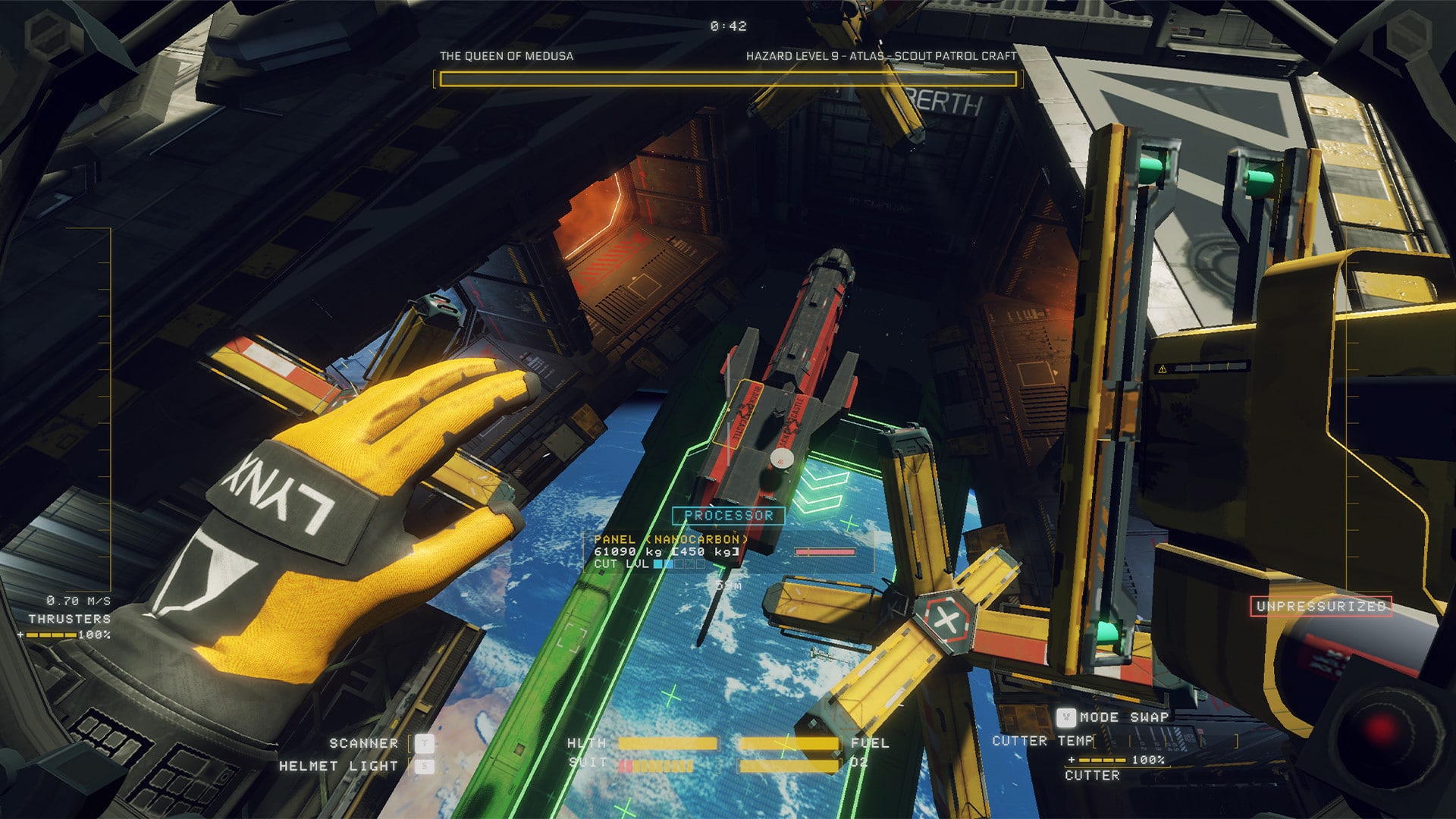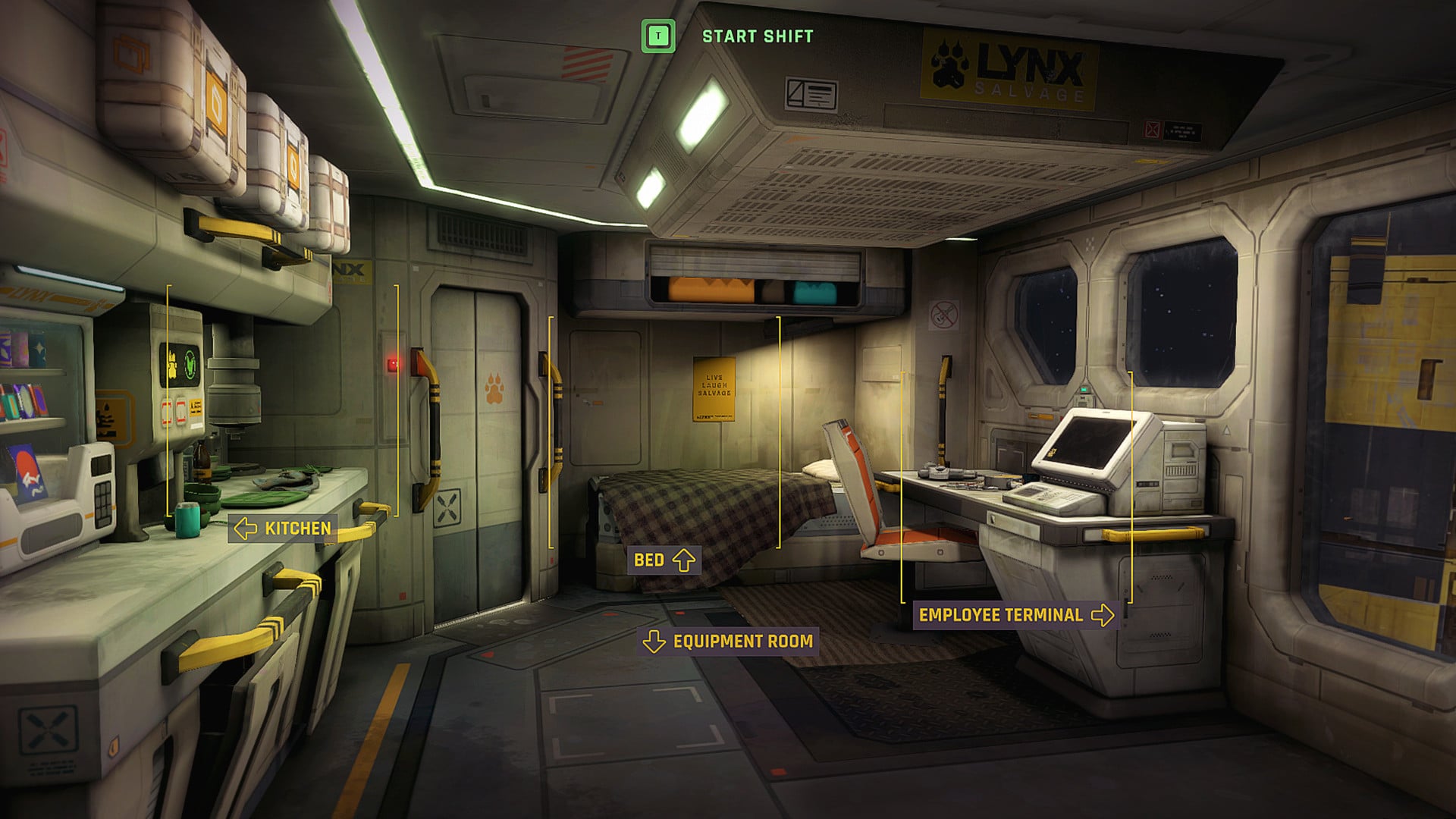Stanley Kubrick’s 2001: A Space Odyssey famously begins with what Arthur C. Clarke called the “longest flash forward in the history of movies,” as an animal bone spins up into the sky after being struck by one of humankind’s ancestors and is suddenly replaced by a rotating satellite. It’s a mesmerizingly ambitious edit that also performs a narrative sleight of hand — in showing how far we have come in a few million years, the edit takes attention away from the need to explain how we got there.
Kubrick and Clarke’s 2001 is a classic of so-called hard science fiction, a genre concerned with scientific rigor and a pro-scientific outlook, but it’s representative of the way science fiction often skirts the nuts and bolts of its subject matter. We imagine travel to faraway stars, but we often take little time to look in any depth at our means of getting there.
Hardspace: Shipbreaker turns all of this on its head. As a salvager of disused spaceships, it’s your job to take a long time looking in a lot of depth at every craft that comes through your orbital zero-gravity decommissioning rig. Your aim is always to scrap the craft as quickly as possible, but where, when, and how to cut, pull, and detonate its various parts is a matter of careful planning. Accidentally cut through a fuel tank, for example, and you will blow away a chunk of the ship and risk getting caught in the blast. But take too long separating out each constituent and you may need to take a break to top up your fuel and oxygen, not to mention reduce your earning capacity for the day.
In career mode, the difficulty ramps up gradually. The first ship you decommission is barely more than a few sheets of nanocarbon welded together — the simplicity of the job is counterbalanced by the initial hour or two of frustration with Shipbreaker’s precise but often unforgiving zero-gravity simulation. But as you progress through the career or try free play, you eventually take on enormous, structurally complex cargo ships that present multiple hazards and require deft maneuvering through Shipbreaker’s space.

Despite the fictional subject matter, Hardspace: Shipbreaker is most at home in the burgeoning job simulator genre. So it’s not surprising that it eventually settles into a similar kind of dangerously addictive, serenely relaxing rhythm as in the likes of Euro Truck Simulator. It’s a rhythm that’s ripe for reflection.
Pulling ships apart forces a confrontation with how they are put together. And as you melt away countless joists with your laser cutter, it’s difficult not to wonder whether anything in front of you could ever be convincingly space-worthy. Your scanner renders each vessel like a fake Owners’ Workshop Manual, but it focuses on the gratifying complexity of cutting points, structural weaknesses, and salvage types, rather than on the exponentially greater complexity of the ship’s flight. A nacelle, for example, cannot be broken down but gets scrapped wholesale, and so there is no explanation of the engines that drive these ships.
In other words, Hardspace: Shipbreaker is not exactly the inverse of 2001. It’s not that 2001 skims over the details of space flight while Shipbreaker zeroes in on the nuts and bolts of it. It’s that Shipbreaker zeroes in on the literal nuts and bolts. Even if its ships look suspiciously like something out of the Homeworld franchise (not a surprise, perhaps, given developer Blackbird Interactive’s other projects), Shipbreaker is not interested in their function. At the end of the day — or, more accurately, work shift — they all reduce to more or fewer parts.

In this sense, Hardspace: Shipbreaker is a subtly clever subversion of hard science fiction. Unlike the genre classics that revel in space flight or take it for granted, Shipbreaker points to its cost — the literal credit cost of each piece of a spacefaring vessel, but also the human risk bound up with it. The result is a deconstruction of some of science fiction’s oldest staples into the most prosaic bits and pieces and a weighing of these against the human element. Put simply, it’s difficult to romanticize space flight when you spend every day risking your life to recycle a lightbulb for a few credits.
These subtler queues are complemented by Shipbreaker’s more on-the-nose narrative. The world is a dystopia of late-stage capitalism and hyperinflation. Space flight has turned our solar system into an industrialized junkyard, and the all-powerful LYNX Corporation profits endlessly both from space flight and space salvage. Its salvage operation is thinly disguised indenture — you start the game with a LYNX package that puts you over 1.2 billion credits in debt to the corporation, and your career is a slog to pay off the debt, exacerbated by the need to buy your own oxygen, fuel, suit repairs, and even your own “resurrection.” LYNX has the right to clone you and put you back to work should you die, but you have to pay for the privilege. Your time off work is spent in a tiny one-room apartment adjacent to the decommissioning rig, reading spam and work emails, listening to peppy ads, and sleeping.
It’s an existence that’s both worryingly precarious and bleakly constant, one more at home in a cyberpunk dystopia than traditional science fiction. But that is precisely the point of Hardspace: Shipbreaker — its anatomical butchering of spaceships doesn’t fuel an obsession with future technology, so much as it prompts a hard look at some of the costs of that obsession.





